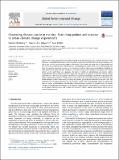Files in this item
Contesting climate justice in the city : examining politics and practice in urban climate change experiments
Item metadata
| dc.contributor.author | Bulkeley, Harriet | |
| dc.contributor.author | Edwards, Gareth A. S. | |
| dc.contributor.author | Fuller, Sara | |
| dc.date.accessioned | 2014-08-15T10:01:01Z | |
| dc.date.available | 2014-08-15T10:01:01Z | |
| dc.date.issued | 2014-03 | |
| dc.identifier | 89469519 | |
| dc.identifier | e9aa86f5-7fda-4cde-88b3-2feb73d9885d | |
| dc.identifier | 84898429309 | |
| dc.identifier | 000335636900004 | |
| dc.identifier.citation | Bulkeley , H , Edwards , G A S & Fuller , S 2014 , ' Contesting climate justice in the city : examining politics and practice in urban climate change experiments ' , Global Environmental Change , vol. 25 , pp. 31-40 . https://doi.org/10.1016/j.gloenvcha.2014.01.009 | en |
| dc.identifier.issn | 0959-3780 | |
| dc.identifier.uri | https://hdl.handle.net/10023/5168 | |
| dc.description | This paper draws on work undertaken through Harriet Bulkeley's ESRC Climate Change Fellowship, Urban Transitions: climate change, global cities and the transformation of socio-technical systems (ESRC RES-066-27-0002) | en |
| dc.description.abstract | Debates about climate justice have mainly occurred at the international scale, and have focussed on the rights and responsibilities of nation-states to either be protected from the effects of climate change, or to take action to reduce emissions or support adaptation. In this paper, we argue that it is both productive and necessary to examine how climate justice is being pursued at the urban scale, which brings into focus the need for attention to issues of recognition as well as rights and responsibilities. Building on work from environmental justice, which has conceptualized justice as trivalent, we propose that climate justice can be understood as a pyramid, the faces of which are distributions, procedures, rights, responsibilities and recognition. We then apply this conceptual framework to examine climate change interventions in five cities; Bangalore, Monterrey, Hong Kong, Philadelphia and Berlin. Arguing that the politics and practices of urban climate change interventions are constantly engaging with and refracting the idea of justice, we examine how justice was articulated, practiced and contested across our cases. The perspective of recognition emerges as a particularly useful entry point through which to explore the types of rights, responsibilities, distributions and procedures required to respond justly to climate change. We conclude by reflecting on our framework, arguing that it is useful both as an analytical device to interrogate climate justice and to shape the design of climate change interventions which seek to ensure climate justice. | |
| dc.format.extent | 10 | |
| dc.format.extent | 492931 | |
| dc.language.iso | eng | |
| dc.relation.ispartof | Global Environmental Change | en |
| dc.subject | Climate justice | en |
| dc.subject | Climate change | en |
| dc.subject | Urban politics | en |
| dc.subject | Cities | en |
| dc.subject | Justice | en |
| dc.subject | GE Environmental Sciences | en |
| dc.subject | SDG 13 - Climate Action | en |
| dc.subject.lcc | GE | en |
| dc.title | Contesting climate justice in the city : examining politics and practice in urban climate change experiments | en |
| dc.type | Journal article | en |
| dc.contributor.sponsor | The British Academy | en |
| dc.contributor.institution | University of St Andrews. Geography & Sustainable Development | en |
| dc.identifier.doi | 10.1016/j.gloenvcha.2014.01.009 | |
| dc.description.status | Peer reviewed | en |
| dc.identifier.grantnumber | SG121306 | en |
This item appears in the following Collection(s)
Items in the St Andrews Research Repository are protected by copyright, with all rights reserved, unless otherwise indicated.

